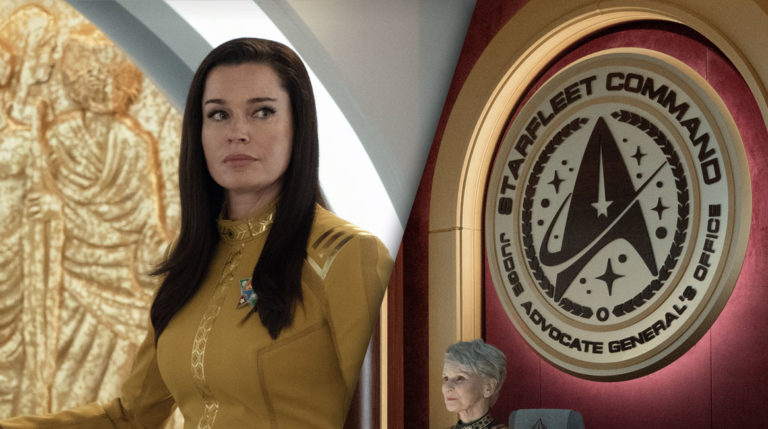
Strange New Worlds S2E2: Ad Aspra per Aspera
The second-whiniest criticism of the Paramount+ era of Trek (several light years behind “too woke”) is that it’s “too dark,” and that Gene Roddenberry’s utopian future has been polluted with tough moral choices and a falls well short of perfect. It’s a criticism that fundamentally misunderstands Star Trek, which from the very beginning presented a future in which humanity had solved problems like hunger and poverty, but still acknowledged that human nature presents an endless parade of moral quandaries, and that we all must constantly strive to be better in the face of those.
“Ad Astra per Aspera” — cited here as the title and in the episode itself — is Starfleet’s motto. “Through hardships to the stars.” It becomes a metaphor not just for exploration, but for human progress of any kind. We struggle to get closer to perfection that we’ll never reach, but it’s the struggle that matters. Our ideals are only meaningful when they’re tested.
This week’s episode is an atypical episode of Star Trek — no one fires a phaser or beams down to a planet, and in fact the Enterprise never leaves spacedock. And yet it’s as much a classic Star Trek episode as anything Paramount+ has given us. It’s a courtroom drama — in the tradition of the original series’ “The Menagerie,’ which introduced Captain Pike, or Next Generation’s “Measure of a Man,” in which Data’s humanity is put on trial — and it’s about how our nebulus ideals aren’t always reflected in the hard edges of our laws.
Strange New Worlds has been building to this episode since late last season, when it was revealed that Commander Una Chin-Riley — Pike’s Number One — was an Illyrian, a human splinter group who genetically engineer themselves to survive a planet’s environment instead of trying to change the environment to suit them. That seems understandable, even admirable, but the Federation has been burned by genetic engineering before. The Eugenics Wars have been part of Trek lore since Khan Noonien Singh was introduced as a villain in the original series. (Hilariously in retrospect, these brutal wars in which genetically-enhanced supermen wiped out millions in an attempt to rule the Earth took place in the 1990s, according to the original series’ future timeline.)
Neither judge nor prosecution are interested in delving into the rights and wrongs of the Federation’s attitudes towards genetic engineering. As far as they’re concerned, Una broke the law, plain and simple. She lied about being genetically enhanced on her application to join Starfleet, and has maintained that lie for 25 years as she moved up the ranks.
Her public defender is woefully unequipped to make her case, so Pike travels to an Illyrian planet (despite not being able to breathe the air there) to enlist the help of Neera Ketoul, an Illyrian civil rights lawyer who has a not-entirely-amicable past with Number One. She’s unmoved when Pike says he feels the Federation is wrong to be prejudiced against her kind — too little, too late — but she’s swayed when he suggests a win in this high-profile case could bring a lot of attention to her cause. Which is complicated by the fact that Starfleet wants nothing more than to keep things quiet and hush up the fact of Una’s existence, and that she was able to hide in plain sight for so long.
Yetide Badaki (American Gods) turns in a terrifically nuanced performance as Neera — she resents Una, she despises Starfleet, and she’s more interested in serving her own agenda than her client… but she’s also a talented, dedicated lawyer, who gets a few genuinely inspiring moments. It’s a wonderfully complex performance, especially since her counterpart, a sneering Vulcan prosecutor, gives as campy a performance as anyone on the original series. (And that isn’t a criticism, the contrast actually works in the episode’s favor; Neera has to make a delicate argument against someone who’s exceedingly blunt.)
Pike desperately wants to help, but he’s relegated to the sidelines. The assistant prosecutor, Captain Batel, is an old flame of his, and while they can’t help flirting, she also makes it clear that if Pike takes the stand he’ll be implicated, as he knew Una’s secret and didn’t report her. So with no captain to come to the rescue, we get lengthy courtroom scene, and while it hits many of the clichés anyone who’s seen an episode of Law & Order are familiar with, up to and including, “I’ll allow it, but you’d better be going somewhere with this, counselor!”, it also gives us some terrific moments.
At the onset, Una and her fellow Illyrians’ persecution at the hands of Starfleet is made to stand in for virtually every kind of bigotry and oppression known to man, and it’s a bit broad and heavy-handed. But then the crew are called as character witnesses, and Spock, La’an, and M’Benga make impassioned defenses of Una’s character. It’s a terrific use of the ensemble in an episode that isn’t about them, as they underline their emotional connections to Una, not to mention why she embodies the ideals of the organization that’s trying to prosecute her.
In fairness, this would hit harder if we had spent more time with Number One in the series thus far. Despite Rebecca Romijn being far and away the biggest name in the cast, Una’s the least developed character, and apart with her friendship with La’an, we don’t get a great sense of her beyond stiff professionalism. (By contrast, by early season two of Next Generation, when “Measure of a Man” aired, we were 35 episodes in and Data was the most interesting character in most of those, so we cared deeply about his fate.)
The episode corrects for this, as Una makes the best character witness for herself. She speaks to the ideals — and motto — that attracted her to Starfleet despite the Federation persecuting her people, while also telling a harrowing story of living under that persecution, and the fear she’s lived with her whole life.
It’s not a spoiler to say things largely work out in the end. But it’s still a bittersweet ending. (Vague spoilers for that ending follow, so skip ahead to the stray thoughts if you’d rather be completely surprised.)
Neera makes a grand moral argument, but in the end it takes a backseat to a legal technicality that sets Una free. And while the case makes Starfleet reconsider their treatment of one officer, they stop short of reckoning with their treatment of Illyrians on a larger scale. It’s not the victory everyone was hoping for, but as Neera says with satisfaction, it’s a start.
A vision of the future where every moral problem is already solved isn’t a hopeful or inspiring story, it’s a childish, one-dimensional one. A future where we strive, through hardship, to be better, is a story worth telling, and a mode of storytelling that’s made Star Trek endure through the decades. We are all lying in the gutter, but some of us are looking at the stars.
Stray tachyons:
* The crew doesn’t have much to do, but we get a terrific scene where Ortega mocks Spock from across the mess hall for being chummy with the Vulcan prosecutor, but M’Benga corrects her, pointing out how subtly Vulcans show that they hate each other. The kicker is that Spock — who remained stone-faced throughout his conversation — crosses the room to apologize to Ortega and M’Benga for his ”outburst.”
• For the second week in a row, we don’t see much of Pike after the pre-credits scene. That’s mostly a good thing. Anson Mount is terrific as the captain, but the cast is deep enough that he can take a step back and we don’t feel like we’re losing anything. It’s only a shame we only have a 10-episode season and don’t get more time to spend with him and everyone else in the cast.
• I’m well aware that I use the crew’s first and last names wildly inconsistently. La’an and Una are just easier to both say and read than Noonien Singh and Chin-Riley, neither of which trip off the tongue, whereas I have no such issue with Pike, Ortegas, M’Benga, or Chapel. (And the show seems to agree, as it refers to those two characters by their first names more often than the rest.)
